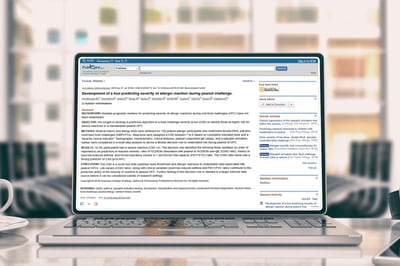Since the World Health Organization recorded the first cases of a novel coronavirus in December 2019, the SARS-CoV-2 virus has spread around the world at lightning speed, ushering in a public-health emergency that has disrupted every aspect of our “normal” lives. With the benefit of revolutionary new technologies, including sophisticated computational modeling, high-throughput single-cell multi-omics, and affordable genome sequencing, scientists and clinicians around the world have made rapid progress in understanding, treating, and fighting the spread of the virus. But such rapid scientific progress could not be achieved single-handedly. Instead, what we have witnessed is a coordinated effort within the scientific community to collaborate and share their research and data openly across disciplines and around the globe.
To make their research findings available quickly and widely, scientists working on COVID-19 have used a myriad of available dissemination channels to share their data and ideas -- including public sequence data repositories, preprint servers, and scientific journals. Knowing that rapid sharing of research data would be essential in fighting the COVID-19 pandemic, scientific publishers responded quickly, with many signing a January 31 statement organized by the Wellcome Trust outlining their commitments on sharing research outputs in relation to the outbreak. [1] Over 152 publishers signed this statement, including most of our publishing partners. In doing so, they were making a public commitment to fast-track the publication of COVID-19 results and to make these publications free to access. [1]
To further support rapid data sharing and collaboration, most publishers have also established COVID-19 resource pages that make it easy to find the most recent and relevant articles. Many journals are also encouraging or requiring authors to post their submitted manuscripts to preprint servers so they are publicly available during the formal review process and are adopting additional practices, such as creating pools of available peer-reviewers in various areas of expertise, in order to shorten publication timelines. [2]
Staying true to the commitments first declared in January, scientific publishers are routinely publishing COVID-19 articles within days or weeks of submission, instead of the usual six months or more. To explore the implications of transforming the peer-review process to a timeframe that fits the needs of this current public health crisis, we reached out to a selection of scientific journal publishers from a range of disciplines. Below, we've included some of the key insights shared with us.
Planning and Early Initiatives
Among the publishers we heard from, most expressed that, while they had plans in place for responding to a novel disease outbreak, they had not foreseen having to enact these plans with a reduced staff and 100% virtual operations. Past outbreaks such as Ebola and Zika virus did not lead to large scale quarantines or nation-wide stay-at-home orders. But in February, just as journals began processing and publishing the earliest breakthroughs in COVID-19 research, they were also figuring out how to operate under conditions of a global pandemic.
As a spokesperson from the Wiley editorial office shared, “We have a comprehensive continuity and crisis management plan but we never could have foreseen what this pandemic has brought about in our world. Our first priority was ensuring the safety and wellbeing of our staff. As a digital company, we were able to transition and adjust quickly to keep our publishing operations on track. We take very seriously our responsibility in getting trusted information to the world.”
As an open access publisher, PLOS by default, had all COVID-related articles freely available immediately on publication. To ensure uninterrupted publishing operations, they reported that they began monitoring the outbreak in early January and quickly adapted their plans as the situation developed, with contingency planning stepped up through February and early March as the outbreak became more severe.
Fortunately, the majority of publishing is done digitally today, allowing scientific journals to continue to operate throughout the pandemic, with some publishers processing a higher volume of submissions and at a faster pace than before the workplace closures began.
In addition to being fast to adapt to a stay-at-home workforce, publishers quickly began implementing special practices for handling COVID-19 submissions. These include forming triage teams to focus attention on submissions that are the most urgent to public health, publishing uncorrected proofs of accepted papers online as soon as possible, and sharing peer-reviews on manuscripts redirected to a different journal or publisher.
At the American Academy of Pediatrics (AAP), publisher of the journal Pediatrics, COVID-19 initiatives began in early March as the editorial team began triaging manuscript submissions and working through all the necessary steps to be able to rapidly deliver open access COVID content on the journal site.
PLOS and Wiley confirmed that the publishers have maintained the commitments they made in signing onto early publishing initiatives driven by Wellcome Trust and other scholarly organizations. These commitments include fast-tracking critical COVID-19-related submissions, making these articles freely available, and sharing relevant research data of submitted manuscripts directly with the World Health Organization.
Handling COVID-19 Submissions
Journals reported receiving their first COVID-19 submissions between late January and early March, with the rate of submissions increasing sharply beginning in March.
Wiley, publisher of more than 1,000 journals, began seeing COVID-related submissions in early January and has since published over 3,000 COVID-19 related articles, which include research manuscripts, news, letters, commentaries, and editorials.
Pediatrics received its first COVID-19 submission on March 3rd from an author group in China, and this was the first COVID manuscript the journal published. Since then, Joe Puskarz, Director of Journal Publishing stated, “we were inundated with COVID submissions, an average of 50 articles in a given week, which has increased editorial staff workload to process the COVID content in addition to non-COVID content.” Fortunately, Pediatrics has an extensive database, so finding reviewers for COVID articles hasn’t been difficult. They have been able to maintain an average turnaround time, from acceptance to pre-publication posting, of about 1.5 to 2 weeks for articles that are most urgent for public health.
However, this isn’t always the case, particularly when dealing with a broader scope and higher volumes of research, as was the case for PLOS. From Joerg Heber, Editorial Director at PLOS, “It has not always been easy to find reviewers for manuscripts during the pandemic, but we are truly grateful to those that are contributing their time and expertise to take these submissions forward.” Even with the challenge of assigning peer-reviewers, the median time from submission to editorial acceptance for COVID-19 papers is 50 days, with much shorter timelines for studies that have immediate interest for public health. They have also formally expanded their scooping policy to support their authors in addition to extending flexibility of deadlines for reviewers and authors.
Connecting Scientists to Information and Ideas
Since the start of the pandemic, nearly referencing COVID-19 have been published and indexed on PubMed, and more than 7,500 preprints related to the pandemic are available on preprint servers (biorxiv/medrxiv and arxiv). But with hundreds of new articles on the topic being published daily, it becomes difficult and time-consuming for researchers and clinicians to pinpoint the few studies that will provide the data they need to design their next experiment, or to find information about the best way to treat a specific patient.
In order to foster fast and easy literature searching, COVID-specific resource pages have been developed on NCBI and public health sites, and most journals have established dedicated COVID/coronavirus resource pages with quick searching and direct links to all published articles.
Some publishers are going even further. In addition to their COVID-19 Resource Site, Wiley partnered with the online publishing platform Atypon to launch an AI-driven real-time Scitrus feed, which aggregates the latest research, preprints, and news on COVID-19 in a sleek and easy-to-navigate web layout.
Similarly, Springer Nature is developing a feature that uses AI to produce up-to-the-minute reports on COVID-19 literature [3]. The resulting reports group publications together based on their topic, provide snippets of text allowing readers to grasp what they are about quickly, and then link directly to the Springer Nature publication. (Click here to see an early version of this developing feature).
Since the start of this pandemic, hundreds of scientific publishers and their dedicated staff have devoted extensive time and resources to help ensure the rapid and open publication of COVID-19 research. The resulting pool of scientific information has enabled vast improvements in patient care, the rapid development of diagnostic tests, and, most remarkably, 28 vaccine candidates being tested today in clinical trials. [4]
Research Solutions has also created a COVID-19 Gadget that's freely available to the public, which brings together relevant COVID-19 articles from across all major publisher, as well as resource links directed to the different publishers' COVID-specific pages.
Stay Tuned for More
The undeniable and marked success of COVID-era publication and data sharing practices has led to questions about whether some of these practices should continue beyond the current public health crisis. While it may not be practical to expect researchers, publishing staff, and peer-reviewers to maintain this breakneck pace in the long term, practices such as open access publishing, publishing of preprints, and open sharing of data before publication, have been under discussion and debate in the scientific publishing community for several years. These practices require little if any extra workload and can significantly increase the rate and extent to which scientists collaborate and advance knowledge in all areas of STEM research.
Sign up for our blog newsletter to be alerted on subsequent blogs in this series, which will explore ongoing discussions about the lasting impact the pandemic may have on scientific publishing.
References
- https://wellcome.ac.uk/coronavirus-covid-19/open-data
- https://oaspa.org/covid-19-publishers-open-letter-of-intent-rapid-review/
- https://www.springernature.com/gp/researchers/the-source/blog/blogposts-life-in-research/how-can-ai-support-the-research-community-in-times-of-crisis/17852232
- https://www.nytimes.com/interactive/2020/science/coronavirus-vaccine-tracker.html
(accessed June 30, 2020)
Leah Rodriguez | VP of Marketing
Leah has over 17 years of experience in publishing and software with various roles leading and developing marketing teams. Prior to joining Research Solutions, she was at Nature Publishing Group, launching marketing for their open access journals, Nature Communications and Scientific Reports and at PLOS, developing...


